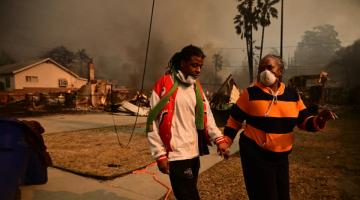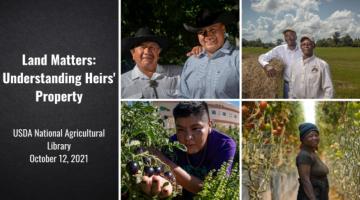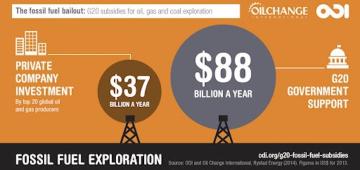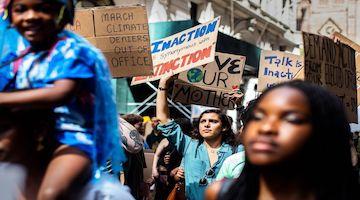Residents line up for dry ice in a neighborhood without power in a 2019 heat wave in Brooklyn, New York. (Photo: Seth Wenig / AP Photo)
The earth recently experienced its hottest days on record. Here in the U.S. Black people face the worst consequences of the climate crisis.
There was no more defining moment in modernity than the beginning of the Industrial Revolution. Within that revolution domestically to the United States, the most significant incident was the Titusville, Pennsylvania oil drilling find, which began our internal deluge of oil. This was the beginning of the troika of oil, coal and gas being the foundation of our modern economy.
As the saying goes “there are no free lunches”. With this abundance of cheap energy, the release of carbon in our environment has caused a constant rise in our temperatures globally over the past approximately 180 years.
Although the Global South is most susceptible to being afflicted by climate change (even though they are most innocent of contributing to this issue), there are internal communities in the United States that are vulnerable to many of the climate instability issues that are a direct result of our carbon emissions for decades.
In that vein of vulnerability, there is no more unprotected collective in the United States than the Black community in general. This is due to the historical economic disenfranchisement of Black people in the United States. As the only key to being insulated from the worst aspects of climate change in its current form is through financial stability, the economic fragility that has been a hallmark of this community due to systemic racism makes it most susceptible to feeling the effects of climate change more than any other group.
As reported by ABC news:
“The rates of emergency department visits for heat-related causes increased by 67% for African Americans, 63% for Hispanics, 53% for Asian Americans and 27% for white people from 2005 to 2015, according to a report in the Wilderness and Environmental Medicine journal.”
This is revelatory as far as the vulnerability of Black people and non-Anglos in general by comparative standards when it comes to ethnicity. And as we are seeing increasing temperatures as our carbon emissions are growing with each and every year, these numbers will continue to increase for the U.S. population. This is an unspoken truth in mainstream media for the most part since this is construed as divisive by many people to acknowledge there is an ethnic component that is prevalent when it comes to the climate crisis.
As temperatures across Asia, Europe and the U.S. have reached historic levels, one of the things that presently is needed to combat the potential heat prostration is air conditioning. As this is an infrastructure issue and conducive to dealing with the current heat problem that is increasing with each and every year, slowly but surely, we will have to address the increasing cost of heating and cooling and the lack of resources available to the Black community.
The numbers show that we are assured of seeing a 3.6 to 7.2 degree Fahrenheit change in the global environment by 2100. As people primarily on the right believe that the climate has always been changing and not indicative of any real problem, the fact of the matter is that the human species needs a relatively stable climate to allow us to survive in perpetuity.
Now, in releasing more carbon into the atmosphere and seeing a current 2.0 Fahrenheit (1.5 Celsius) increase in global temperature, this has been one of the most devastating aspects of our contemporary survival and the ability to insulate ourselves from the calamitous effects of climate instability.
Under the current system, there has been nothing as bipartisan as the lack of concern about the climate crisis by both political parties. However, what is most disingenuous is that the Democratic Party expresses faux concern about climate change but offers no meaningful policy changes.
What this all means is that over time, Black people will be more susceptible to death due to the change in temperature. As many Americans are unconcerned about climate change due to the lack of belief in the phenomena, Latino and Black Americans as a group are more concerned about climate change than the white community (see graphic below), this is a sign of the economic security due to class where you don’t have to deal with climate change due to your ability to insulate yourself. And as economic security is a byproduct of ethnicity in the Western world in large part, the lack of experiencing the deleterious effects of climate change during your daily life is a sign of individual protection from the worst effects of climate change.
In the vein of being susceptible to climate change and the temperature increases that are a natural byproduct of our current release of carbon in voluminous amounts, economic stability is the first step to combating this in the immediate future.
Now, as the safety of capitalism allows for physical security from climate change, which is primarily an Anglo phenomenon in current circumstances, the need currently is for Black people to receive reparations due to the current increasing climate and overall environmental issues that are prevalent in these communities. One of the most toxic terms in American society is the word “reparations”, but there is no more proper term for what needs to be afforded to the Black communities when it comes to environmental problems.
In response, Black people need to be given supplemental help by the state when it comes to addressing these historical inequalities. Of course, there must be an acknowledgement there is a problem and we collectively have not reached that stage. Until we do, the Black community will be increasingly vulnerable to the planet being on fire.
Forrest Lamar Palmer is an electrical engineer residing in Houston, Texas, although originally born and raised in Los Angeles, California. Outside of his professional life, his personal concern is the environmental issues and their increasing prevalence daily in society, as well as the past and current ethnic hierarchy that is the basis of systemic global racism.


![How Joe Biden and The Democratic Party’s Climate Agenda Increases Environmental Racism More Than It Reduces Emissions [A Three Part Series]](/sites/default/files/styles/nc_thumb/public/2023-09/cancer%20alley%20protest.jpg.jpeg?itok=kOK48inx)












